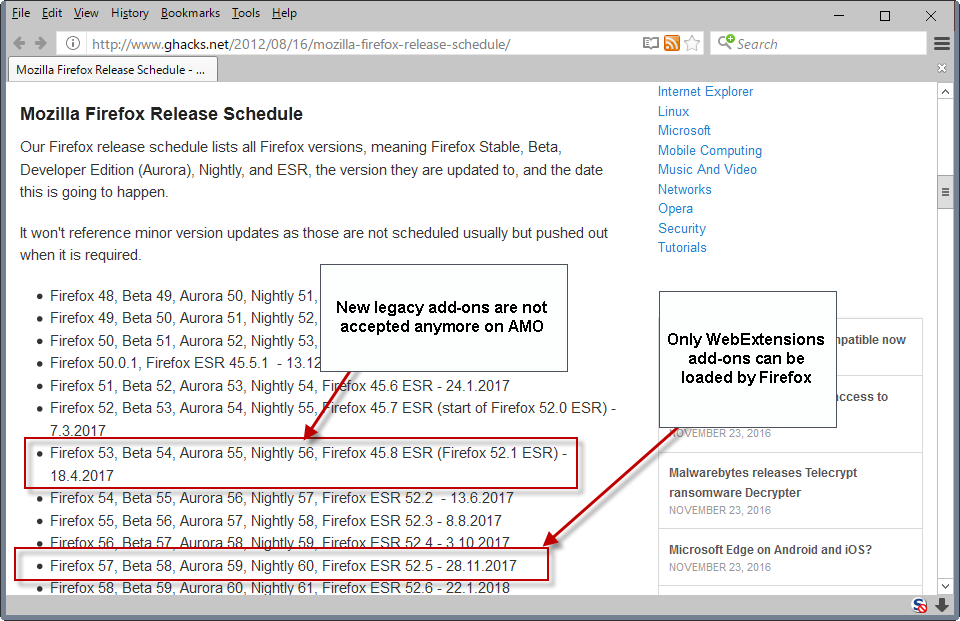Firefox will only support WebExtensions by the end of 2017
Mozilla announced a far reaching change coming to the organization's Firefox web browser in late 2017.
The organization plans to cut support of all extension technologies but the rather new WebExtensions when Firefox 57 Stable is released.
Support for WebExtensions was introduced in Firefox 48 Stable, and new capabilities were added in newer releases.
According to the announcement, Firefox 57 will block the loading of any non-WebExtensions add-on automatically.
By the end of 2017, and with the release of Firefox 57, we’ll move to WebExtensions exclusively, and will stop loading any other extension types on desktop.
This means that any add-on not converted to WebExtensions by that time will no longer be available regardless of whether it is already installed in Firefox or discovered on Mozilla's add-ons repository.
Firefox will only support WebExtensions by the end of 2017

Firefox 57 will only load the following add-on types:
- Signed WebExtensions.
- Signed bootstrapped system add-ons.
- Language packs.
- Dictionaries.
- OpenSearch plugins.
- Lightweight themes.
You may notice that complete themes are not listed, as are not any legacy add-ons that make the bulk of Firefox's extension offering. Mozilla appears to be working on a theming API however that provides more options to customize Firefox than lightweight themes. It is still too early to tell what it will be capable of, and how it compares to the existing full theme functionality in Firefox that will be deprecated in Firefox 57.
Mozilla plans to stop accepting new extensions that are not WebExtensions in Firefox 53. AMO (Add-ons Mozilla Org) won't sign new SDK, XUL or XPCOM extensions for Firefox desktop with the release of Firefox 53. This has no affect on existing add-ons at this point in time, and won't affect Firefox on Android, Thunderbird, or SeaMonkey extensions.
Firefox 53 is scheduled for release on April 18, 2017, and Firefox 57 for a release on November 28, 2017.
New APIs and capabilities will be introduced throughout the year according to Mozilla to add missing capabilities to the WebExtensions system of Firefox.
Throughout the year we’ll expand the set of APIs available, add capabilities to Firefox that don’t yet exist in other browsers, and put more WebExtensions in front of users.
Consequences
Firefox users who have legacy add-ons installed in the browser won't be able to use them anymore when Firefox 57 is released. Firefox ESR will run legacy add-ons as the change won't affect the extended support release version right away (the version is at 52.5 at the time of the release of Firefox 57. The earliest option for ESR is when Firefox ESR 59 is released in 2018).
Part of the add-ons that are currently available for Firefox will be ported to WebExtensions by their developers. Another part won't. This does not only include add-ons that are no longer in active development, but also add-ons that cannot be ported because of missing functionality.
Many Chrome extensions will work directly in Firefox however or can be ported relatively easily by their developers.
The core advantage of WebExtensions is that the technology does not depend on the browser. This means that any new change to Firefox's core functionality won't affect WebExtensions add-ons.
Closing Words
The decision marks a major cut that makes the Australis redesign or decisions such as putting Pocket or Hello in Firefox look like minor issues.
This move affects the add-ons that made Firefox. Sure, there are other parts of the browser that appeal to users, but for many, it was Firefox's add-on system that won them over.
While many popular add-ons will be ported to remain available, this cannot be said for all of them let alone the bulk of add-ons that are not popular enough.
Some Firefox users who rely on certain add-ons may migrate away from Firefox to Pale Moon or another third-party browser that shares code with Firefox.
Others might switch to Chrome directly, considering that the one major feature that distinguishes Firefox from Chrome and other browsers is no longer there for the most part.
It is too early to ring the Doomsday bell but if this move tanks, it could very well have disastrous consequences for Mozilla.
This article was first seen on ComTek's "TekBits" Technology News

- Log in to post comments